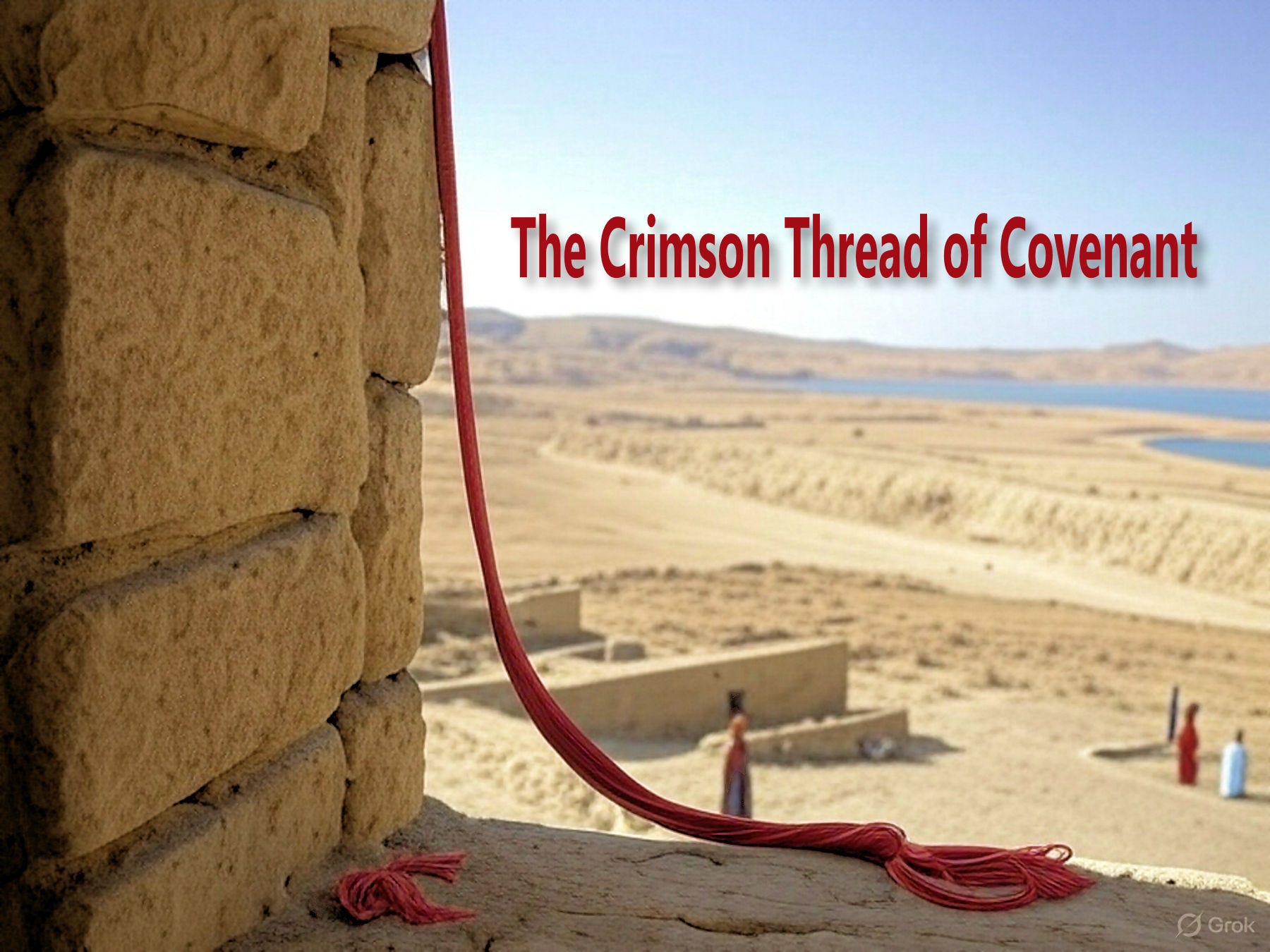I am Shapash, once bound to the hollow gods of Jericho’s stone altars, now a daughter of Israel’s enduring promise, all because of my little sister, Rahab. Her courage, her piercing faith, wove a crimson thread through the tapestry of our lives, binding us to a God who saw us—outsiders in a city doomed to ruin—and called us His own. Let me unfold her story, not of the fleeting souls who staggered through our inn’s weathered doors, but of a woman who glimpsed truth amid Canaan’s shadows, leading us to a hope that stretches across generations, from our days to a king yet to rise.
In those days, Jericho pulsed with defiant pride, its towering walls a fortress against the desert’s perils and the whispered threat of an approaching people. Our inn, carved into the city’s outer wall, was Rahab’s domain, a bustling stopover for a motley throng: spice traders with sunburned faces, wanderers seeking a night’s rest, and pleasure-seekers chasing the delights of Canaan’s gods. It was no haven of righteousness, but a pragmatic refuge where men of every stripe laid their heads. Some bartered for barley bread and a straw pallet; others came for the debauchery deeper in Jericho’s heart, where the temple of Baal and Asherah stood, its cedar pillars draped in ivy, its courtyards alive with frenzied rites. Through labyrinthine streets, past the spice market’s clamor of saffron and myrrh, priests chanted hymns to the storm god, and shrine women offered their bodies for coin and devotion, their laughter mingling with the clink of silver in torchlit shadows. Rahab’s inn was merely a waypoint. Guests arrived, their sandals gritty with dust, then vanished into the city’s alleys, returning at dawn, bleary-eyed and stumbling, to sleep off their wine-soaked excesses on our clay floors.
They lurched through our door, cloaks stained with incense and lust, demanding, “Where’s the temple? Where are the sacred dances?” Rahab, scrubbing clay mugs or sweeping the hearth’s ashes, would gesture toward the city’s core. “Take the main road, past the market’s stalls, to the pillars of Baal,” she said, her voice sharp, betraying no warmth for their idols. One night, a Tyrian sailor, his breath sour with ale, leered at her. “No idols here, woman? No Asherah to bless your trade or warm your nights?” Rahab’s eyes narrowed, her hands stilling on the broom. “My inn shelters travelers, not gods,” she replied, turning to stack firewood with deliberate calm. I, Shapash, thought her curtness reckless, my fingers tracing the clay figurine of Asherah hidden in my sleeve, my heart still tethered to the altars of our youth. But Rahab was listening, not to the temple’s distant drums echoing through Jericho’s heart, but to tales that drifted in with every caravan, tales of a God whose power reshaped the world.
Whispers of Israel, a people led by a God who parted seas, shattered armies, and claimed this land as His own, wove through our nights like threads in a loom. Jericho’s lords mocked these stories, their laughter thin with fear, but Rahab absorbed every word, her mind a crucible for truth. “Shapash,” she murmured, bolting the inn’s heavy door against the desert wind’s howl, “if this God humbles nations, He’s no idol. He’s one…alive, true.” I dismissed her, my loyalty to our gods unshaken, fearing her words would bring ruin upon our house. But Rahab’s intellect, sharp as a flint blade, weighed each tale, sifting rumor from reality with a clarity I lacked, her reason guided by a spark of divine insight, as if the God she spoke of was already calling her.
One dusk, as the sky blazed crimson over the Jordan’s distant banks, two men slipped into our inn, their cloaks weathered, their eyes keen with purpose. Rahab’s gaze caught a fleeting glint: a thread of techelet, blue as the deep sea, woven into one’s hem, tucked carefully beneath his robe, a sign of Israel’s covenant with their God. She froze, her breath catching, then ushered them to a shadowed back room, her voice barely audible. “Shapash, help me,” she urged, piling flax stalks over the trapdoor to the roof. “They’re spies!” I hissed, my heart hammering against my ribs. She touched the hidden blue thread, her fingers trembling. “This is Israel’s sign, a thread of God’s law. They conceal it to live…life outweighs wearing it openly. These are His men.”
The king’s guards arrived soon, their fists pounding our door like thunder. “Hand over the foreigners!” they snarled, their torches casting jagged shadows. Rahab, steady as the stones beneath our feet, lied with unnerving calm: “They fled at twilight, toward the Jordan’s banks.” As the guards stormed off, their curses fading into the night, she climbed to the roof, where the men crouched among the flax, their breath shallow. “I know your God,” she said, her voice resolute, her eyes alight with conviction. “He gives you this land. Spare my family when you come, I beg you.” They nodded, pressing a crimson cord into her trembling hands. “Tie this in your window,” one said. “It will mark you as ours.” I, quaking beside her, saw madness in her trust, but Rahab’s certainty, rooted in reasoned faith, silenced my doubts, her choice a deliberate turn from our past to a God she deemed true.
That night, as we tied the crimson cord to the window’s lattice, its fibers rough against our fingers, Rahab spoke of Israel’s God, her words slicing through the fog of my fear. “He’s not like Baal, Shapash. He sees, He acts, He keeps His promises. I choose Him, and I choose His people.” I gripped her arm, torn between the idols of our childhood and the vision she painted, but her resolve was a tether, pulling me toward a truth I could not yet name. When Jericho’s walls collapsed days later, the crimson thread gleamed amid the rubble, a beacon in the dust, and we—our parents, our kin—were led out by those same men, spared by a God whose mercy I was only beginning to understand, His covenant embracing even us, outsiders from a fallen city.
We joined Israel’s camp, a vast sea of tents beneath a sky as boundless as His grace, the air alive with the rhythm of a people bound to their God. Rahab, once a daughter of Canaan, stood in awe, her heart open to their ways, her questions spilling like water from a spring. She sought out a priest, asking about their laws, their halakha, the rulings shaped by a council of elders—a fledgling court, he called it, ordained by God to guide His people in righteousness. “They study Torah,” the priest explained, his voice warm with reverence, “to walk rightly, from the Sabbath’s rest to the scales of justice, ensuring Israel’s covenant endures for all who join it.” Rahab listened, her mind ablaze with wonder, as if the Torah’s words were a map leading to the heart of the Divine, her Gentile roots no barrier to this sacred path.
The first Passover arrived, its memory raw, mere years from the Exodus itself, when Israel’s redemption was carved into history. We gathered in a tent, the air heavy with the weight of deliverance, the scent of roasted lamb mingling with the desert’s dust. Rahab, now woven into Israel’s story, held a piece of matzah, her hands trembling as if grasping a sacred relic. The lamb’s blood was placed on the altar of God, its offering a silent echo of Egypt’s salvation, and the meal unfolded as a testament to freedom. As the leader chanted the story of plagues and liberation, his voice rising over the crackle of the fire, Rahab’s eyes brimmed with tears, her face illuminated by the oil lamps’ glow. “Shapash,” she whispered, her voice fracturing, “I was a Canaanite, an outsider…yet Hashem counts me in this deliverance. Me, among His redeemed!” Tears spilled down her cheeks, tracing paths through the dust of our journey, and I felt my own heart break open, awed by a God who saw us, worshippers of false gods, and invited us to His table, our Gentile origins no obstacle to His covenant embrace. The bitter herbs stung our tongues, the Hallel psalms soared like wings, and Rahab wept, her belonging a miracle she could scarcely believe, her faith a bridge from our past to Israel’s future.
Rahab married Salmon, a prince of Judah, her innkeeping skills now nourishing Israel’s camp with bread and wisdom, her hands kneading dough as her heart shaped a new legacy. Their son, Boaz, grew strong, his generosity echoing his mother’s courage, and from him came David, the shepherd-king whose psalms sang of God’s glory across Judah’s hills. Decades later, I, Shapash, stood in a Judean village, my hair silvered by time, recounting this tale to children gathered by a crackling fire, their faces aglow under the starlit sky. “From Rahab’s faith,” I said, “came Boaz, then David, and now his kin are many—dozens, perhaps hundreds, scattered from Hebron’s vineyards to Bethlehem’s fields, from Jerusalem’s gates to Galilee’s olive groves, not one lineage but many, each a thread in God’s eternal plan.” I paused, my eyes tracing the heavens, where stars burned like promises. “One day, a king will rise, a son of David, to rebuild God’s Temple, where all nations will bow in worship, as Isaiah foretold. He’ll bring peace…teaching Torah to the world, ruling Israel in a kingdom of earth and spirit, his throne as real as these hills.”
The children leaned closer, their eyes gleaming with hope, and I smiled, seeing Rahab’s crimson thread in their dreams—a thread of covenant, binding our past to a future yet to unfold. My sister, the innkeeper who saw truth in a hidden blue thread, led us from Jericho’s ruin to Israel’s promise. Her love for God’s people, her choice to join their earthly covenant, wove us into a story that endures, awaiting the king who will make all things new, his reign a fulfillment of the Torah she embraced


Leave a Reply